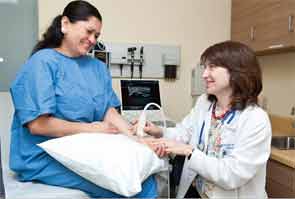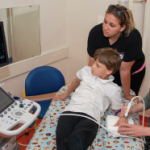
It is here! The ACR launched the long-awaited certification program for musculoskeletal ultrasound (MSUS) in rheumatology at the ACR/ARHP Annual Meeting: Musculoskeletal Ultrasound Certification in Rheumatology, or RhMSUS.
This voluntary certification program helps physicians, physician assistants, and nurse practitioners demonstrate competence in ultrasound to patients, peers, and payers/insurers.
Applicants to the program will need to meet a set of eligibility requirements under one of the six different pathways, pay the fee—$1,500 for ACR members and $1,750 for nonmembers—and pass the examination. There are hundreds of testing sites throughout the U.S. The first testing window will be May 2013, and the second testing window will be November 2013. Those who successfully meet all of the requirements and pass the exam will become RhMSUS certified.
And Now for a Bit of History
The process to determine if the RhMSUS program was necessary has not been a short or easy one, but it has been a labor of extreme care, consideration, and importance to the ACR.
Over the past few years, MSUS has been adopted more widely here in the United States by rheumatologists and other health professionals who treat rheumatology patients. As explored in “American College of Rheumatology Report on Reasonable Use of Musculoskeletal Ultrasonography in Rheumatology Clinical Practice,” studies have shown many potential benefits for adopting MSUS, including faster and more accurate diagnosis, optimized treatment, and improved needle placement accuracy.1 (Turn to page 1 to read more about the MSUS report.) However, the integration of MSUS into rheumatology practice has also raised questions regarding training, education, reimbursement, utilization, competence, certification, and accreditation. As part of the ACR’s commitment to rheumatologists, we gathered experts to examine these questions and provide recommendations regarding the ACR’s role in MSUS. The recommendations have resulted in:
- Training: The ACR has increased support in MSUS education and training. Annually, the ACR now holds several small workshops at the ACR/ARHP Annual Meeting, two two-day fundamentals courses, and one three-day intermediate course with an interventional cadaver workshop. In addition, the ACR’s second eight-month Train-the-Trainer program is currently underway. The goal of this program is to ensure each Accreditation Council for Graduate Medical Education–accredited rheumatology training program has one faculty member who is appropriately trained in MSUS to provide adequate instruction to fellows-in-training. Plans for online activities and mentor programs are currently under evaluation.
- Reimbursement: The ACR’s practice management department actively works on reimbursement issues, including denials for MSUS and overly strict policies. Reimbursement and coding issues through the American Medical Association Current Procedural Terminology and Relative Value Scale Update Committee process are also handled through this department.
- Utilization: The “American College of Rheumatology Report on Reasonable Use of Musculoskeletal Ultrasonography in Rheumatology Clinical Practice” evaluated the reasonable use of MSUS as an additional procedure in the setting of a rheumatologic evaluation and supported use of MSUS in 14 clinical scenarios.
Why Should the ACR Get Involved in Certification?
The ACR’s exploration of certification began in 2010 with the release of the American Institute of Ultrasound in Medicine (AIUM) Training Guidelines for the Performance of Musculoskeletal Ultrasound Examinations. Along with the training guidelines, AIUM developed an accreditation program for MSUS. However, AIUM only accredits the practice or institution and not the individual physician, and the program is intended for MSUS in general, rather than its application in rheumatology. Based on membership surveys, rheumatologists needed a pathway to demonstrate their individual competence in MSUS for rheumatology, and the most verifiable way to do this is through certification because individuals must meet minimum criteria and typically pass an assessment.
A group of experts then convened to determine the feasibility of an ACR certification program. The first step involved a comprehensive survey of the entire ACR membership to gather feedback on MSUS use and interest in certification. Over 80% of the respondents said the ACR should offer MSUS certification for individual rheumatology healthcare providers, and 84% said they would elect to become certified if there was a program available in the U.S. The most influential reasons cited to become certified were:
- To enhance the effectiveness of treatment or diagnosis;
- To learn completely new skills or knowledge;
- To increase competence in current job;
- To maintain or improve current skills or knowledge;
- To keep up to date professionally;
- Proof of competency to show payers/insurers; and
- Expand services provided by the practice/institution.
The next steps involved consultation with Castle Worldwide—one of the nation’s leading certification and licensure testing companies—to conduct a comprehensive job task analysis. The role of the job task analysis was to provide a clear definition of the primary domains, specific task statements, and related knowledge and skills required for competent performance as a certified MSUS professional. Data from the job task analysis supported the development of a specialty certification program and provided a blueprint that could be used for a potential certification program.
A scan of the current healthcare environment involving MSUS was also explored, and it became apparent that, in the future, standards for MSUS will be set. Stan Cohen, MD, ACR past president, states, “My feeling, as well as [the feeling of] others, was that we needed to ensure the competency of our members performing ultrasound. By codifying the competency, we could ensure the ability of rheumatologists to perform in-office ultrasound and be reimbursed for their efforts. Without this process in place, others would try to limit musculoskeletal ultrasound by rheumatologists in the future, as resources for healthcare continue to shrink.”
After careful consideration of the job task analysis, membership survey, and environmental scan, the decision to move forward with a certification was made, and the following goals of the program established:
- Promote quality of care and patient safety through the certification and continuing competency of physicians, physician assistants, and nurse practitioners who perform ultrasound as part of their practice in rheumatology.
- Increase the knowledge and improve competence of physicians, physician assistants, and nurse practitioners who perform ultrasound as part of their practice in rheumatology.
- Provide a voluntary pathway for physicians, physician assistants, and nurse practitioners who perform ultrasound as part of their practice in rheumatology to demonstrate competence to patients, peers, and payers/insurers.
To learn more about the RhMSUS program and how to apply, visit www.rheumatology.org/RhMSUS or contact Katie Duggan, director of certification, at [email protected] or (404) 633-3777, ext. 108.
